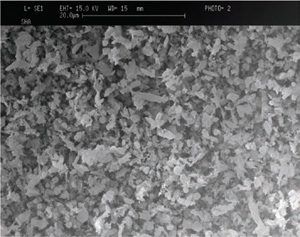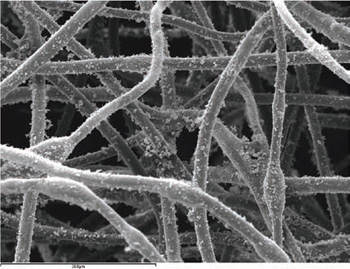Jose Franco discusses air filtration systems, which according to insiders, have been overlooked, underestimated and, sometimes, misunderstood in the region.

Iyad Al Attar
They are the first line of defence for indoor air quality (IAQ) and against airborne foreign particles. And their ability to guard a building’s heating, ventilation and air conditioning systems also means that air filters play a major role in minimising maintenance measures for HVAC equipment in green buildings and aircraft, reducing energy consumption and protecting the human respiratory system. It is, therefore, surprising to learn that the benefits of air filtration have been overlooked.
“I must admit that the field of air filtration has been overlooked and the role of air filters has been underestimated and, sometimes, misunderstood,” says Iyad Al Attar, Regional Director for the Middle East of EMW Filtertechnik, a European company based in Limburg. The importance of air filtration, he adds, is usually brought to everybody’s attention only when there is a pandemic, such as anthrax, severe acute respiratory syndrome (SARS) or Influenza A, otherwise known as the H1N1 virus.
GOVERNMENT SUPPORT NEEDED
What’s worse for the Gulf region is that it has no regulations to test air filters, which come in various forms, simply because there are no testing facilities here, says Al Attar, a Kuwaiti-based mechanical engineer and international air-filtration consultant. “Unless there is governmental support to this issue, testing and regulation adherence has to be done in co-operation with international laboratories,” he stresses.
But he is quick to stress the need to be cautious when using international standards, in order to better understand how each standard rates air filters. Besides existing international standards governing air filter performance and selection, aerosol filtration is also emerging worldwide as a science, with some governments allocating research budgets and grants for its development.
Says Al Attar: “The differences in the international standards add to the complexity of the air-filtration field, and I certainly wish there will be a global standard that can be used as an international tool worldwide. As of today, it is very difficult and, sometimes, impossible to compare air filters using different standards.
“Air filters are considered the final line of defence as far as the air conditioning equipment is concerned. Appropriate filter selection to a specific application is a key to an optimised air filter and HVAC equipment performance.”
NO UNFILTERED VENTING

Surface filtration | Photo courtesy of Iyad Al Attar
Graham Smith, General Manager of the Dubai-based SAT Group, has noted that some municipalities in the UAE now prohibit direct, unfiltered venting of commercial kitchen exhaust grilles, fryers and boilers to the outside. He mentions the Jumeirah Beach Residence (JBR), in Dubai, as an “excellent illustration” of a zero-tolerance attitude by the developer, Dubai Properties, towards unfiltered kitchen exhaust.
With its multilevel walkways and many restaurants, JBR would produce so much airborne pollution if air filtration systems were not fitted. Most of these restos, Smith says, utilise the expertise of the Trion system to convert kitchen exhaust fume into clean air, ensuring residents and visitors of “maximum enjoyment” when dining and shopping. He adds that Trion’s T Series exhaust treatment system prevents particulates of smoke, cooking fats, oils and grease from entering the atmosphere.
Trion’s electrostatic precipitators operate in the higher-efficiency collection range, which is upward of 95% of DOP, or dispersed oil particle, test method. These filtration devices remove extremely small particulate matter – 0.01 microns to 10 microns – from the air stream with extremely low-resistance to the airflow throughout the collection cycle.
Having a patented stainless steel spiked ioniser instead of ionising wires, which are prone to snapping, the Trion system is designed for the harsh environment of commercial kitchen exhaust, Smith says. But the best testament to Trion’s reliability is its being the sole provider for electrostatic air filtration to the US Navy submarine fleet since the launch of the American nuclear submarines more than 50 years ago, Smith adds.
“Since then, all US and British nuclear submarines have been fitted with Trion air filtration systems, guaranteeing clean, breathable air to the personnel on board who can be submerged for months at a time,” Smith says.
FILTERED AIR
Air filters, indeed, are important in providing clean air by removing aerosol particles from the air at different efficiencies with very little resistance, Al Attar says. When applied to, say, the nuclear industry, air filters need to completely remove contaminants (particulate and gaseous) before the air is re-circulated to the indoor environment or released into the atmosphere.
In aircraft, high-efficiency air filters are used to protect the health of crew and passengers and increase their comfort level by controlling the contaminant levels. Al Attar notes that early jet airliners used 100% outside air, in which cabin air was continually released through outflow valves. This process, however, means low engine efficiency and high fuel consumption.
“Therefore, enormous air operating costs have highlighted the use of high-efficiency air filters, to clean the air before feeding it to the aircraft which leads to a reduction in bleed-air quantity,” he explains.

Depth filtration | Photo courtesy of Iyad Al Attar
He adds that a filter’s effectiveness in removing various sizes of particulates depends on its class: a more efficient filter can remove a higher percentage of air particulates, including those of smaller size. “For that reason, it is important to know the types and sizes of contaminants found in a building in order to select the appropriate filter class,” he stresses.
Some airborne foreign particles may arise from natural processes, like wind erosion, sea spray evaporation, volcanic eruption and metabolism or the decay of organic matter. The particulate (solid or liquid) is a major class of air contaminant that covers a wide range of particle sizes from dust large enough to be seen by the naked eye to the submicroscopic particles that escape most filters.
AIR-FILTRATION CHALLENGES
In the Gulf Arab states, the main challenge facing air filtration is the high dust concentration due to frequent sandstorms, which contain suspended dust and other contaminants that are health hazards. Dust can also cause reading errors on computer hard drives and digital tape heads.
Buildings and houses in the Gulf, a dry desert region with extreme temperatures and intense solar radiation with little cloud cover, need high-efficiency air filters to provide them with clean air. In clean room applications, like hospitals, where the air conditioning systems are run throughout the year, the extensive use of pleated HEPA (high-efficiency particle arresting) filters with 100% fresh air is a must.
High-quality air filters allow HVAC equipment and gas turbines to enhance their performance by improving the heat-transfer mechanism in air conditioning systems, or providing clean air to the gas turbines. These favourable results reflect on less shutdown occurrences and low maintenance of HVAC equipment and higher energy output and lower fuel consumption for gas turbines in power stations.
Quoting industry studies, Al Attar says the allowable outdoor respirable (fit for breathing) particulate matter of 10 micrometre (µm) and lower is 150 µm per cubic metre. But during the 1991 Gulf War, when Iraqi leader Saddam Hussein ordered the burning of over 600 oil wells in Kuwait, the local population was exposed to dust concentration as high as 1,000 µm per cubic metre. Air pollutants have been linked to pulmonary fibrosis, lung cancer and respiratory infections.
GREEN-BUILDING AWARENESS
The gas-turbine sector used to be the main consumer of air filters in the UAE, Qatar and Saudi Arabia; now it’s the large shopping malls, gigantic airports and massive green commercial buildings. The need to meet the demand for higher cooling capacity in these countries will surely highlight the benefits of having better IAQ, Al Attar says.
Describing it as “a game-changer” for the air-filtration market, he says green-building awareness has put the spotlight on the need to provide clean air and the essential role air filters play in the process. Air filters can also provide clean air prior to introducing it to the HVAC system, which will require less energy if equipment has a low resistance to the airflow. And this serves as a green aspect of the overall energy consumption for buildings.
“New practices, such as duct cleaning in huge buildings in the above-mentioned countries is just unthinkable, considering the disruption of activities within the building that may arise, and the risk of having additional contaminants,” he adds. “Proper and professional air-filtration measures eliminate the needs of duct cleaning, coil washing and filter regeneration.”
He says Saudi Arabia is the biggest market for air filtration in the Middle East, with the Sahara desert posing a challenge to all existing and new projects, whose main vein constitutes air conditioning. Here, some building owners and designers may opt to shut off the fresh air intake to avoid the high dust concentration. Whilst this is not exactly an unhealthy measure to take, the same application is impossible for hospitals and pharmaceutical industries, which require 100% fresh air.
ON PROPER INSTALLATION
Whilst good maintenance is the key to protecting a building’s HVAC equipment, the system’s proper installation is also important. The latter will ensures that the filtration stages are leak-free and the entire air inside the HVAC units is going through the air filters. Also, the new filtration medium with minipleats has higher surface area in a confined space. This means a longer lifetime for and a higher efficiency of the filter which will, in turn, result in energy saving and reduced risks in contaminating the HVAC equipment.
“I truly believe that emphasis should be reinforced on the proper maintenance measures, as well as in investing in the primary line of defence for the HVAC equipment…” Al Attar says, referring to air filters. He cautions against leaving dust-filled filters in operation, since these consume more energy and release the captured dust into the airstream.
Another issue that he considers of great importance is the disposal of HEPA filters, which capture more microorganisms due to their more efficient properties. These filters should be properly incinerated to prevent contamination, especially of the maintenance personnel who should use masks during the disposal operation.
“I truly believe that air-filtration installation and maintenance training or certification has to be considered for the HVAC maintenance crew, to highlight the critical role of air filters,” Al Attar says. “Illustrative short installation manuals as brief as an A4 page will prove invaluable for every maintenance crew.”
Copyright © 2006-2025 - CPI Industry. All rights reserved.